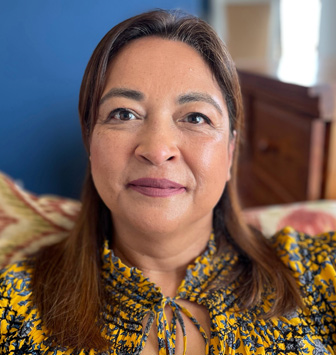Chairholder 2021-2023: Dr Khayaat Fakier

Dr Khayaat Fakier appointed to Prince Claus Chair
As of 1 September 2021, Dr. Khayaat Fakier will hold the Prince Claus Chair at International Institute of Social Studies (ISS), part of Erasmus University Rotterdam on equity and development policies.
‘Putting care at the center of equity and development: challenges for gender aware economies based on an ethics of care for people and the environment’
Dr. Fakier is hosted by Professor Wendy Harcourt at the ISS, Erasmus University.
Dr Fakier is a sociologist with a focus on research in women’s care for others and the environment. Dr Fakier gained her PhD from the University of the Witwatersrand, Johannesburg. She is currently senior lecturer at Stellenbosch University and teaches modules on sociology of work, feminisms and women’s engagement in the South African economy. She supervises students on a wide range of feminist topics, including ecofeminism, fatherhood, women in the legal profession, and women in prisons.
Agustina Solera is a Postdoctoral Researcher and Invited Lecturer at the International Institute of Social Studies of Erasmus University Rotterdam. Dr Solera gained her PhD from the National University of Córdoba, Argentina. She is engaged in fostering knowledge dialogues between cultures. Her academic experience in community-based projects in Patagonia financed by the National Research Council of Argentina has contributed to a collective re-constitution of erased languages, worldviews, beliefs and knowledge.
Will be added during the tenure.
About Dr Fakiers’s research
As holder of the Prince Claus Chair, Dr Fakier will examine the issue of care in relation to equity and development policies. The two-year research project will examine how to build an ethics of care not only for people, but also for the environment. The intent of the research will be to see in what ways care work is ‘the alternative’ value to growth. Working in collaboration with Dutch and international networks her research will seek to define how we can build equitable economies where care work and care-ful relationships with society and nature are central to social and cultural life. The analysis will specifically take into account local communities’ responses to the pandemic.
“What caring eco-citizenship requires is not only the planning and infrastructure that an ecologically sensitive state could provide, but also the recognition and involvement of women as responsive and responsible citizens able to influence decisions. Neglect of women’s voices result in reverse outcomes of a pro-environmental and pro-care policy. Instead women are heard, mostly after the implementation of policies and even then, the justice they receive is too little or too late.”
Khayaat Fakier
Dr Fakier’s research examines the value of social reproduction in a global society where the unpaid work and care conducted by women is not recognised. Her research on the impact of social and industrial policy on the lives of women suggests that working class and underemployed women shoulder the burden of care for the young, the elderly, the frail and the environment, which most state and corporate policies ignore. Her work has featured in renowned international journals such as Antipode: Journal of Radical Geography, the International Journal of Feminist Politics, and Capitalism Nature Socialism.
Her most recent publication is a co-edited book titled, Marxist-Feminist Theories and Struggles Today: Essential writings on Intersectionality, Labour and Ecofeminism published by Zed Books.
Dr Fakier’s writing draws on her work with women working in communities affected by mining, on farms, and women on public works programmes.